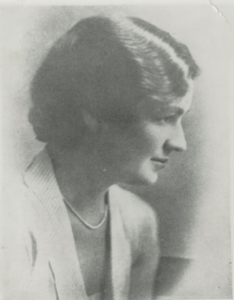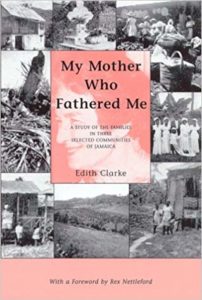
One of a handful of women from Jamaica who enrolled in postgraduate study at the London School of Economics (1926-1931) in the inter-war period of the twentieth century, Edith Clarke (1896-1979) was a well-known anthropologist of the Caribbean in the Caribbean. Born in the largely rural parish of Westmoreland in Jamaica as a member of the local white elite in the then British colony of Jamaica, her agenda of “social reform” challenged the institutionalised racism and sexism of the colonial state (Barrow 1998, 20). A progressive scholar-activist for the time, and later administrator in postcolonial Jamaica, Edith Clarke’s formidable scholarly and intellectual contribution to studies of West Indian kinship and society focused on women’s diverse roles within these institutions. Between First Wave (of the late nineteenth to early twentieth centuries) and Second Wave (the mid-twentieth century) Feminism in the Global North, Clarke’s work situated ‘private’ matters of family life as ‘public’ ones.
Under the tutelage of prominent anthropologist and ethnographer Bronislaw Malinowski, her research in Jamaica was published in the now-influential and oft-cited book, My Mother who Fathered Me: A Study of The Families in Three Selected Communities of Jamaica (1957), which was reprinted by The University of the West Indies Press in 1999. Although funded by the Colonial Social Science Research Council, Clarke led a research team to produce an ethnographically-based study of family, kinship and social relations in colonial Jamaica, which avoided the paternalism that tinged colonial policy. The data collected later informed the West Indian Social Survey, also known as the Jamaica Social Survey. This study confronted the racist biases of colonial state and family planning situated first in African biological, and then cultural inferiority to European superiority, as well as the underlying ethnocentrism, in particular the Eurocentrism of social anthropology.
 Clarke’s study of the three rural communities under the fictitious names of Sugartown, Orange Grove and Mocca, of mostly black residents, demonstrated the variety of family and household arrangements in which women functioned as decision makers. Clarke argued that ‘stable’ families (who would raise productive colonial subjects) consisted of those with cohabiting parents, mother and father alike, but not necessarily legally married, as advocated by the colonial state. It was, she posited, families without co-residential fathers in which mothers had to “father” children that led to structurally vulnerable families. In this comparative study, Clarke situated family and household structure within land use, livelihood activities, gender roles, marriage, sexual and community relations. In doing so, Clarke provided a social pathological explanation for poverty among black Jamaicans. In a period when the colonial state introduced moralising family planning initiatives underscored by incentives for legal marriage, this thesis was a redoubtable challenge that encouraged further studies of social institutions. Although Clarke’s pathological position went against the grain of scientific racism, it reproduced the cohabiting, heterosexual nuclear family as the norm. Later scholars have agreed that while there is an economic basis for various typologies of family in the Caribbean, gender socialisation and persistent patriarchal ideals mean that gendered work is hierarchically valued, raising considerations of Third Wave Feminism. Though mothers may take on the accepted roles of fathers as breadwinners and decision makers, women do not accrue the same prestige as men-as-fathers (see Lazarus-Black 1995; Barrow 1996).
Clarke’s study of the three rural communities under the fictitious names of Sugartown, Orange Grove and Mocca, of mostly black residents, demonstrated the variety of family and household arrangements in which women functioned as decision makers. Clarke argued that ‘stable’ families (who would raise productive colonial subjects) consisted of those with cohabiting parents, mother and father alike, but not necessarily legally married, as advocated by the colonial state. It was, she posited, families without co-residential fathers in which mothers had to “father” children that led to structurally vulnerable families. In this comparative study, Clarke situated family and household structure within land use, livelihood activities, gender roles, marriage, sexual and community relations. In doing so, Clarke provided a social pathological explanation for poverty among black Jamaicans. In a period when the colonial state introduced moralising family planning initiatives underscored by incentives for legal marriage, this thesis was a redoubtable challenge that encouraged further studies of social institutions. Although Clarke’s pathological position went against the grain of scientific racism, it reproduced the cohabiting, heterosexual nuclear family as the norm. Later scholars have agreed that while there is an economic basis for various typologies of family in the Caribbean, gender socialisation and persistent patriarchal ideals mean that gendered work is hierarchically valued, raising considerations of Third Wave Feminism. Though mothers may take on the accepted roles of fathers as breadwinners and decision makers, women do not accrue the same prestige as men-as-fathers (see Lazarus-Black 1995; Barrow 1996).
The politics of gender were evident not only in Clarke’s ethnographic study, but also her position within West Indian academia. Her initial isolation from the ‘chosen circle’ of both radical and progressive mostly male intellectuals advocating for decolonisation (Carnegie 1992, 10) at the Institute of Social and Economic Research (ISER) at what was then the University College of the West Indies in Jamaica (now The University of the West Indies) evidences how the androcentric bias was entrenched systemically. Such experiences reflect how inequalities are reproduced even within the centre of radical thought and action. Despite these attitudes, the originality of Clarke’s research was acknowledged by influential Caribbeanist social anthropologist, Michael G. Smith at the ISER, who wrote the introduction to the 1966 edition. In the twenty-first century, reflecting on Clarke’s work and the surrounding environment solidify efforts toward decoloniality and advocacy for equitable social change.
Essential Reading:
Clarke, Edith. 1957. My Mother who Fathered Me: A Study of the Families in Three Selected Communities of Jamaica. London: Allen & Unwin.
Further Reading:
Barrow, Christine. 1998. “Edith Clarke: Jamaican Social Reformer and Anthropologist.” Caribbean Quarterly Vol. 44, No. 3/4, Celebrating 50 Years of The UWI (Sept/Dec. 1998), pp. 15-34.
Carnegie, Charles. 1992. “The Fate of Ethnography: Native Social Science in the English-speaking Caribbean.” New West Indian Guide / Nieuwe West-Indische Gids Vol. 66, Issue 1-2, pp.5-25.
Bush, Barbara. 2013. “Colonial Research and the Social Sciences at the End of Empire: The West Indian Social Survey, 1944–57.” The Journal of Imperial and Commonwealth History Vol. 41, Issue 3, pp. 451-474.
Lazarus-Black, Mindie. 1995. “My Mother Never Fathered Me: Rethinking Kinship and the Governing of Families.” Social and Economic Studies Vol. 44, No. 1, pp. 49-71.
Questions:
1.In Second Wave Feminism, the slogan ‘the personal is political’ captured the ideological position of this movement. How did Edith Clarke’s research reflect this ideology?
2.How was Edith Clarke’s ethnography situated within a school of social pathology?
3.What were the criticisms of Clarke’s social pathological position regarding the roles of mothers and fathers within Caribbean families? How are these criticisms related to class and race?
Submitted by Shelene Gomes